List of IELTS Cue Cards for Topic - Time
6 min read
Updated On
-
Copy link
Practice speaking using the given IELTS cue cards for topic - time to achieve a score of 9 on the speaking exam. Get sample answers with related IELTS vocabulary and discover some helpful techniques for managing different time cue cards.
Table of Contents

Limited-Time Offer : Access a FREE 10-Day IELTS Study Plan!
Time plays a central role in our memories and experiences. That is why many IELTS Speaking Part 2 cue cards are built around it, asking you to recall a specific point in time or describe how time influenced an event or decision. Therefore, while practising from the list of IELTS cue cards for topic - time requires clear storytelling, a good grasp of tenses, and the ability to reflect on how the moment impacted you.
In this blog, you will find a list of IELTS time cue cards, related vocabulary, sample responses, tips to handle common tense errors in IELTS and improve your fluency and better handling of the IELTS cue cards on time.
List of IELTS Cue Cards for Topic – Time
Time cue cards in the IELTS exam ask you to describe an experience that took place at a certain moment, season, age, or time of day/year. These cue cards are not just about the clock, they explore how time shapes our emotions, decisions, and milestones.
Below is a handpicked list of latest IELTS speaking cue card topics with sample answers that focus on time and practicing with these topics will help you express emotions with confidence.
- Describe a Family Member Who You Spend the Most Time With – IELTS Speaking Part 2 and Part 3
- Describe a Time When You First Talked in a Foreign Language: IELTS Cue Card Sample Answers
- Describe a Period When You Were Busy IELTS Cue Card
- Describe a Time You Missed an Appointment – IELTS Cue Card Sample Answers
- Something You Did Which Was a Waste of Time – IELTS Cue Card Sample Answers
- Describe a Time When You Looked at the Sky – IELTS Cue Card Sample Answers
- Describe a Time When You Heard Some Good News – IELTS Cue Card
- Describe a Time When You Were Very Afraid – IELTS Cue Card
- Describe a Time When You Were Stuck in a Traffic Jam - IELTS Cue Card
- Describe a Time When You Had to Go to a Hospital or See a Doctor - IELTS Cue Card
- Describe a Situation (or time) When You Received Some Useful Advice – IELTS Cue Card Sample Answers
- Describe an Incident Where Someone Apologized to You - IELTS Cue Card Sample Answers
- Describe an Occasion When You Got Lost IELTS Cue Card
- Describe a Time When You Borrowed Something – Band 9 Sample for Part 2 & 3 with Audio
- Describe a Time You Received a Call from Someone You Do Not Know: IELTS Speaking Part 2 Sample Answer
- Describe a Time When You Used the Internet to Solve a Problem IELTS Speaking Part 2 Sample Answer
- Describe a Time You Had to Change Your Plan - IELTS Speaking Part 2 Sample Answers
- Describe a Time You Received Terrible Service – IELTS Cue Cards Sample Answers
- Describe a Time You Spent a Lot of Money on Something: IELTS Speaking Part 2 Sample Answer
- Describe How You Would Spend Your Day Off – IELTS Cue Card
- Describe an Appointment That Was Put Ahead of the Schedule – IELTS Cue Card
- Describe Something You Want to Do If You Get Free Time- IELTS Cue Card
- Describe Something You Want to Do But Don’t Have Time For- IELTS Cue Card
- Describe a Time You Taught Something New to a Young Person
Do you find it challenging to share how you shaped your life?
Join our IELTS online classes and boost your Speaking skills for FREE!
Vocabulary for IELTS Cue Cards on Time
IELTS vocabulary is an important component of the speaking test, so we have compiled a list of some important words and phrases needed to score 8.0+ in the table below.
|
Word / Phrase |
Meaning |
|---|---|
|
On time |
at the scheduled or correct time; not late |
|
In time |
early enough for something; before something happens |
|
Behind schedule |
later than planned |
|
Schedule conflict |
when two events happen at the same time, causing a clash |
|
Last-minute |
done or happening at the latest possible time before an event |
|
At the crack of dawn |
very early in the morning |
|
Ahead of time |
before the expected time |
|
Once in a blue moon |
very rarely |
|
From time to time |
occasionally but not regularly |
|
Procrastinate |
to delay doing something that you should do |
|
Pressing |
urgent or needing quick attention |
|
Time-consuming |
taking a lot of time to do |
|
In the long run |
over a long period of time |
|
Earlier/later than expected |
happening before or after the anticipated time |
|
In hindsight |
thinking back on something after it has happened |
|
At that point in time |
referring to a specific moment in the past |
|
Lose track of time |
forget the time because you are so involved in something |
|
For hours on end |
for a long time without stopping |
|
Momentous |
very important or serious, especially because it may have a big effect |
|
Overdue |
not done or happening at the expected time |
|
Punctual |
arriving or doing something at the expected or planned time |
|
Daily routine |
the regular set of activities you do every day |
|
On a tight schedule |
having very little time to do something |
|
Take your time |
do something slowly or carefully without hurrying |
|
The right time |
a suitable or appropriate moment for something |
|
Time flies |
time passes very quickly |
|
Kill time |
do something to occupy yourself while waiting |
|
Before long |
soon; in a short time |
|
Run out of time |
to have no more time left to finish something |
|
Wait it out |
to wait patiently for something to end |
Looking for a self-study guide for the IELTS Speaking test? Your search ends here!
Tips to Answer Time IELTS Cue Cards
Here are some useful IELTS Speaking tips to impress the examiner, that you can follow while preparing for the list of IELTS cue cards for the topic - time during preparation as well as the actual exam:
- Be Clear with Time References: Make sure to mention when the event occurred—whether it was ‘last year’, ‘during my school days’, or ‘on a rainy Monday morning’. This helps you stay grounded in the cue and makes your story easy to follow.
- Master Tense Usage: Since these topics focus on the past, use past tenses to describe the event (past simple, past continuous, past perfect). You can switch to present tense when explaining what the event means to you now. For example: At that time, I had never spoken in public before. Now, I feel much more confident.
- Add Specific Time-Related Details: Don’t just say ‘it happened one day’. Adding more rich details by including time markers. For example: It was 6:30 AM on a winter morning in January. I remember the streets were empty and foggy.
- Reflect Deeply on the Experience: Don’t just describe what happened. Try to share more about how it affected you or what you learned. This adds emotional depth, a key feature of successful time cue card responses.
- Practice Describing Short vs Long Time Periods: Some cue cards focus on brief moments (e.g., ‘a time when you forgot something important’), while others may ask about longer durations (e.g., ‘a time when you were very busy’). Adjust your storytelling style accordingly.
To sum up, time cue cards are an excellent opportunity to show your storytelling ability, vocabulary range, and control of IELTS grammar while reflecting on a meaningful experience. So, practice structuring, building your time-related vocabulary, and incorporating emotional reflection. It will enable you to give compelling and fluent answers that impress the examiner.
Useful Links:
- Recent IELTS Topics in IELTS Speaking Tests 2025
- IELTS Speaking Lessons
- How to Organize Your Responses on the IELTS Speaking Exam?
- Self-Introduction for IELTS Speaking Test: A Complete Guide
- 50 Recent IELTS Speaking Part 2 and 3 Topics with Model Answers for IELTS
- Person Related Cue Cards for IELTS Speaking
- List of IELTS Cue Cards for Topic – Location/Place
- 151 IELTS Multilevel Speaking Part 2 & 3 Topics with Model Answers
- 5 Silly Things You Say To Decrease Your IELTS Speaking Band Score
Frequently Asked Questions
How much time for cue card?
Can I use time-related idioms in my answer?
What kind of grammar is important for time cue cards?
How can I clearly express the timing of an event in my response?
What if I can’t remember an exact time or date for the event?

Start Preparing for IELTS: Get Your 10-Day Study Plan Today!
Explore other Speaking Topics
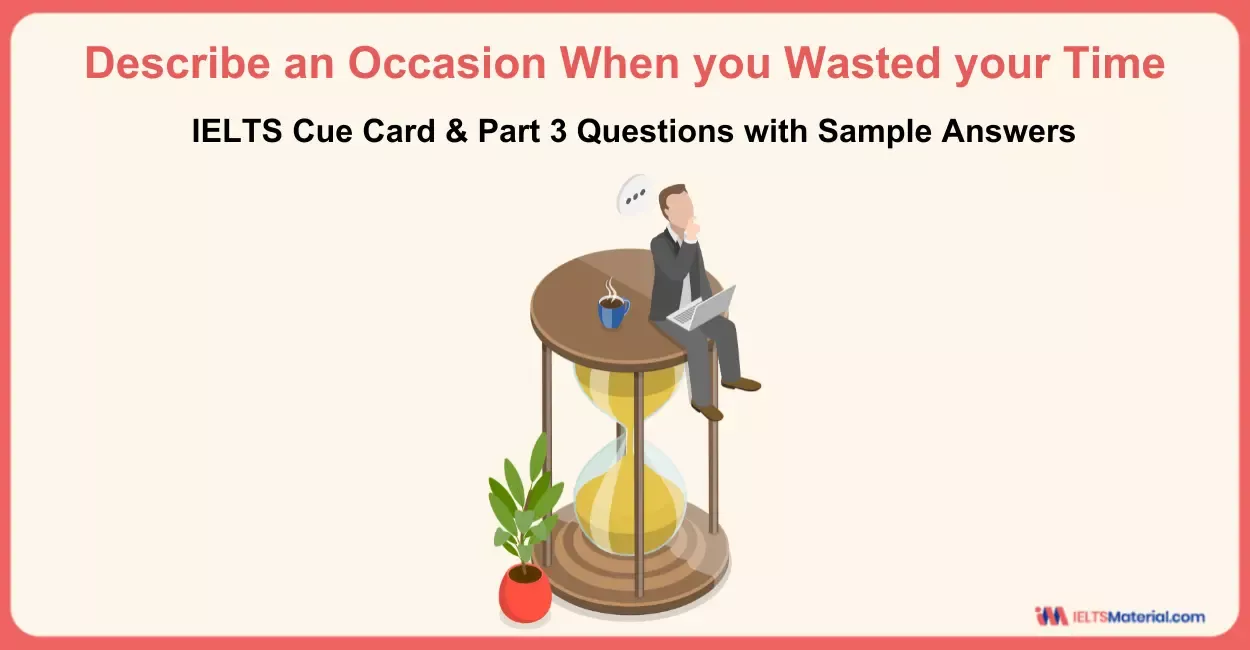

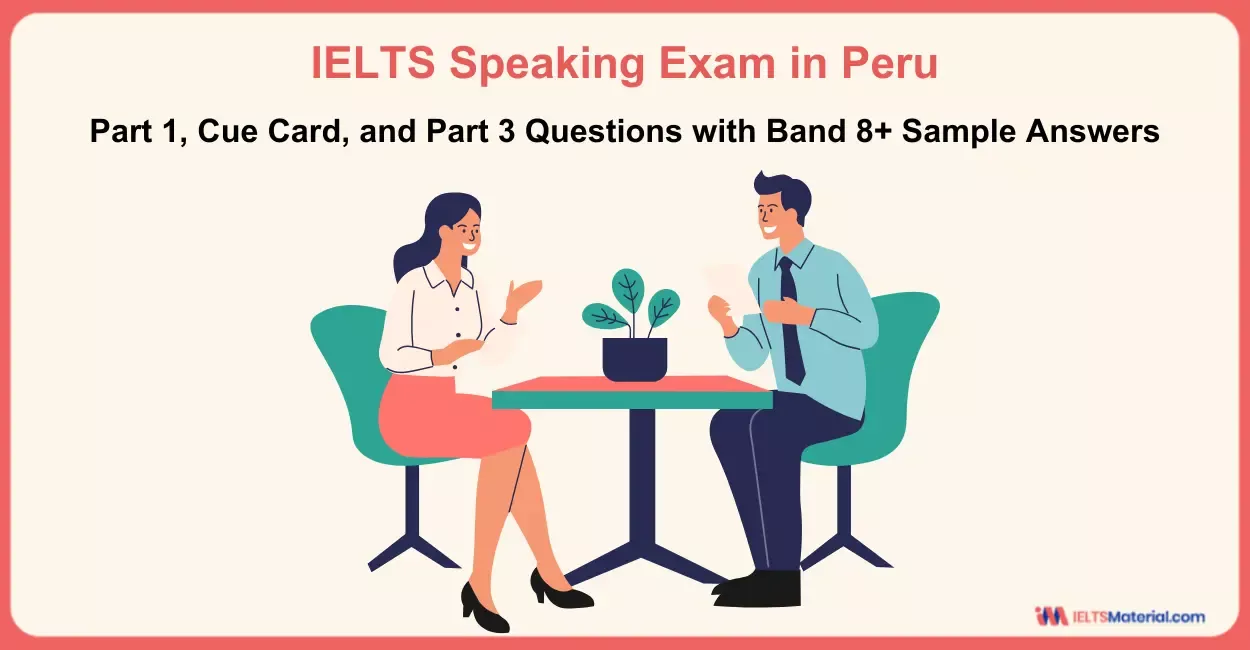
Recent Articles

Haniya Yashfeen
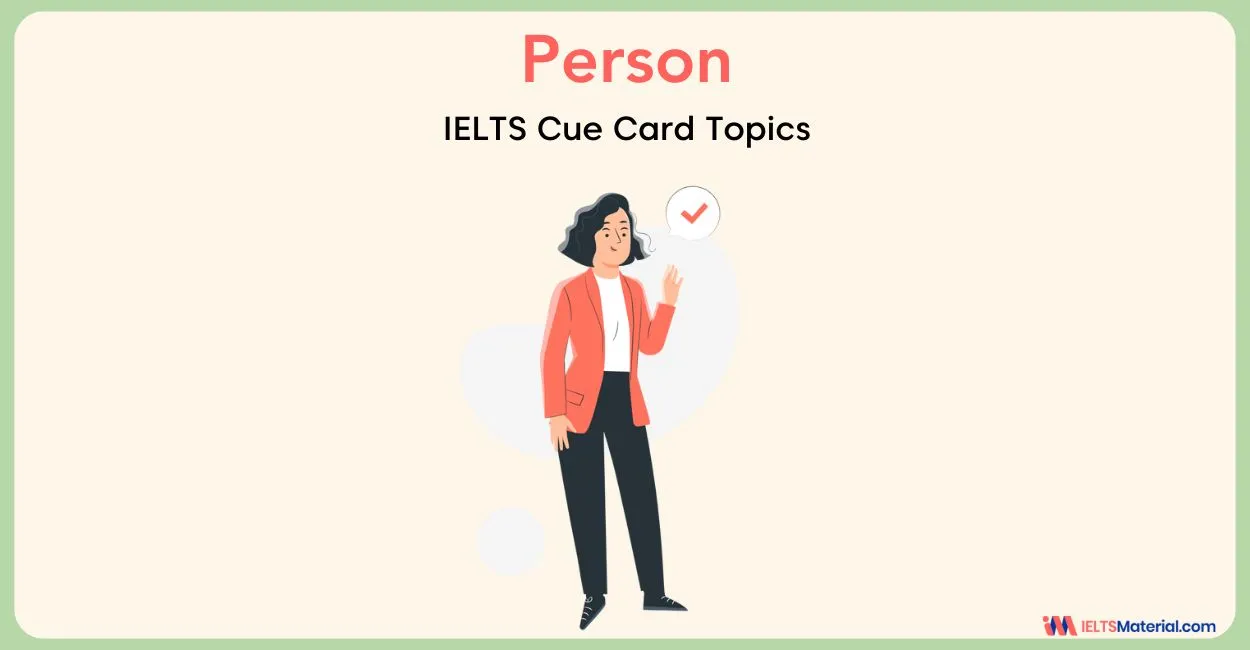
Kasturika Samanta

Nehasri Ravishenbagam


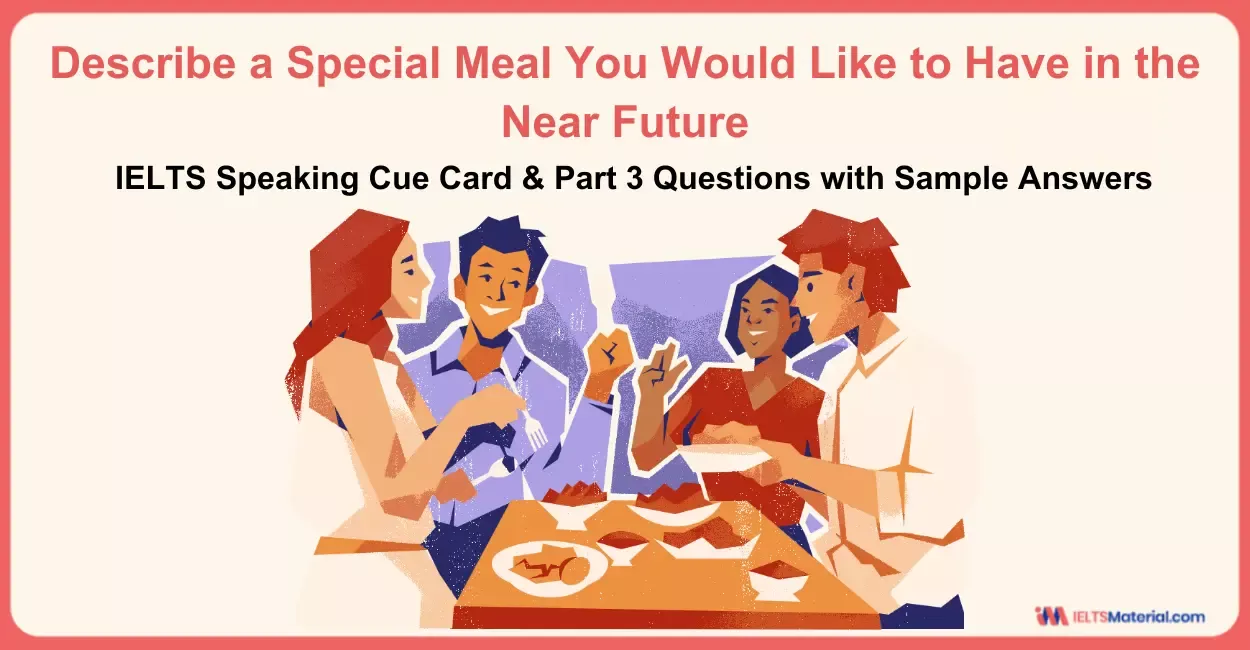
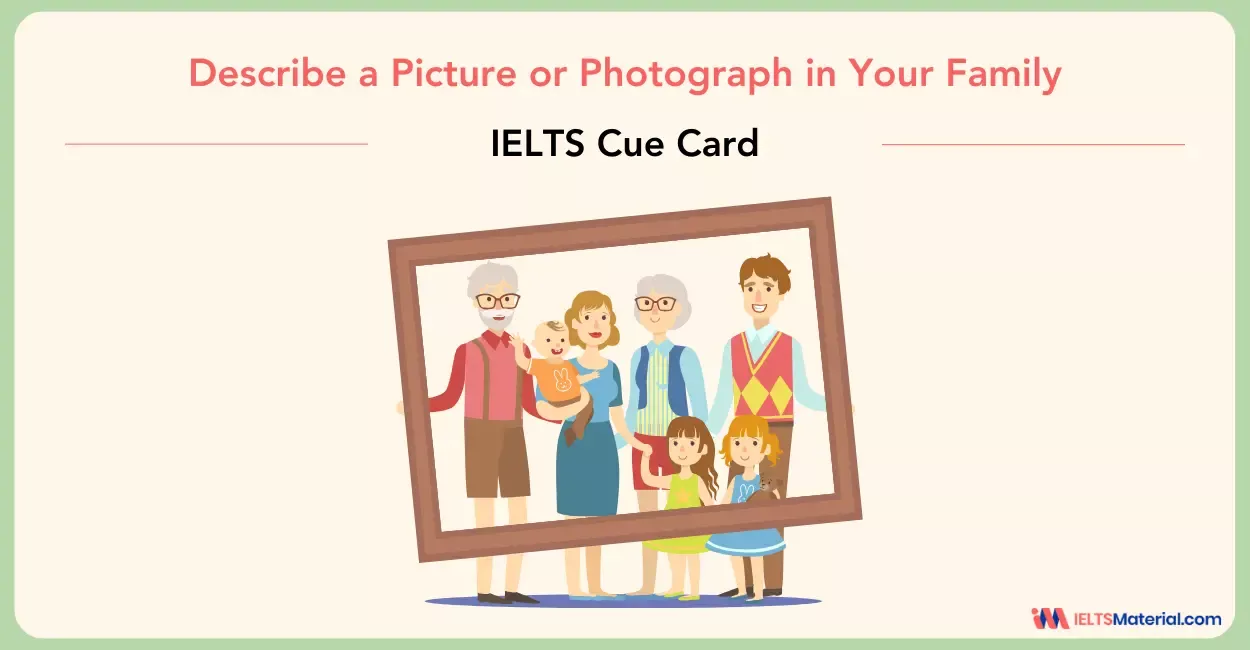


Post your Comments